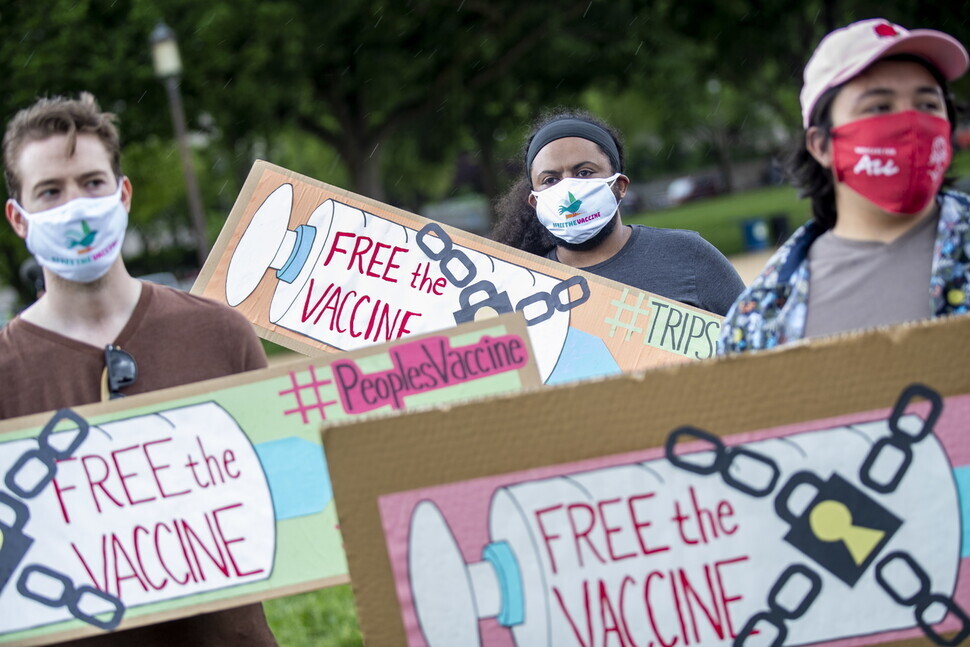hankyoreh
Links to other country sites 다른 나라 사이트 링크
[Editorial] Vaccine manufacturers should rally behind US government’s call for COVID-19 vaccine patent waiver

The Biden administration has announced its support for temporarily waiving intellectual property protections for COVID-19 vaccines. That’s a major step forward in the global debate about expanding production and fairly distributing the vaccines.
US President Joe Biden and US Trade Representative Katherine Tai released a statement on Wednesday stating that they support temporarily waiving patents for COVID-19 vaccines at the World Trade Organization (WTO).
A debate about patent waivers has been underway at the WTO since October 2020, when the issue was raised by India and South Africa. So far, around 100 countries have voiced support for the proposal, but it has aroused sharp opposition from countries that are home to multinational pharmaceutical firms, including the US, the EU, the UK and Switzerland.
This shift in stance by the US, with its dominant position in the vaccine industry, represents a major turning point in the debate that could lead to progress.
The crucial factor now is the attitude of the multinational pharmaceutical companies that have developed the COVID-19 vaccine. They’re firmly opposed to temporarily waiving patents on the vaccines, concerned that it would set a precedent that would energize calls for allowing generics for other patented drugs.
But if these firms continue to monopolize the vaccines, humankind may not be able to emerge from this terrible catastrophe.
As of the end of April, only about 430 million doses of COVID-19 vaccines had been produced around the world, enough to inoculate 215 million people. At that rate, the world’s poorest countries won’t be able to vaccinate their populations on a large scale until 2023, the Guardian reported.
While rich countries are speeding up their vaccination programs and gradually returning to normal life, 400,000 people are being infected with COVID-19 each day in India, where they can’t even get decent medical treatment.
Around the world, access to vaccines is tied to wealth to a horrifying extent, with poor people left in the lurch. If the pandemic continues to rage in unvaccinated countries, viral variants that undermine vaccine effectiveness will cross national borders, ultimately endangering vaccinated countries as well.
Intellectual property should be respected to ensure that new medicines are developed. But we’re currently in a catastrophe.
“This is a global health crisis, and the extraordinary circumstances of the COVID-19 pandemic call for extraordinary measures,” said Tai, the US Trade Representative, in her statement.
Around the time of World War II, humanity managed to eradicate smallpox by sharing techniques for manufacturing antibiotics. If the multinational drug companies agree to a temporary waiver and a technology transfer, the whole world can quickly overcome the vaccine shortage. It’s time to set aside the calculus of profit and join forces in the spirit of solidarity and cooperation.
Please direct comments or questions to [english@hani.co.kr]

Editorial・opinion
![[Column] Season 2 of special prosecutor probe may be coming to Korea soon [Column] Season 2 of special prosecutor probe may be coming to Korea soon](https://flexible.img.hani.co.kr/flexible/normal/500/300/imgdb/original/2024/0426/3317141030699447.jpg) [Column] Season 2 of special prosecutor probe may be coming to Korea soon
[Column] Season 2 of special prosecutor probe may be coming to Korea soon![[Column] Park Geun-hye déjà vu in Yoon Suk-yeol [Column] Park Geun-hye déjà vu in Yoon Suk-yeol](https://flexible.img.hani.co.kr/flexible/normal/500/300/imgdb/original/2024/0424/651713945113788.jpg) [Column] Park Geun-hye déjà vu in Yoon Suk-yeol
[Column] Park Geun-hye déjà vu in Yoon Suk-yeol- [Editorial] New weight of N. Korea’s nuclear threats makes dialogue all the more urgent
- [Guest essay] The real reason Korea’s new right wants to dub Rhee a founding father
- [Column] ‘Choson’: Is it time we start referring to N. Korea in its own terms?
- [Editorial] Japan’s rewriting of history with Korea has gone too far
- [Column] The president’s questionable capacity for dialogue
- [Column] Are chaebol firms just pizza pies for families to divvy up as they please?
- [Column] Has Korea, too, crossed the Rubicon on China?
- [Correspondent’s column] In Japan’s alliance with US, echoes of its past alliances with UK
Most viewed articles
- 1Is Japan about to snatch control of Line messenger from Korea’s Naver?
- 2‘We must say no’: Seoul defense chief on Korean, USFK involvement in hypothetical Taiwan crisis
- 3S. Korea “monitoring developments” after report of secret Chinese police station in Seoul
- 4The dream K-drama boyfriend stealing hearts and screens in Japan
- 5Division commander ordered troops to enter raging flood waters before Marine died, survivor says
- 6[Editorial] New weight of N. Korea’s nuclear threats makes dialogue all the more urgent
- 7No good, very bad game for Korea puts it out of Olympics for first time since 1988
- 8[Column] ‘Choson’: Is it time we start referring to N. Korea in its own terms?
- 9‘Weddingflation’ breaks the bank for Korean couples-to-be
- 10[Column] Season 2 of special prosecutor probe may be coming to Korea soon